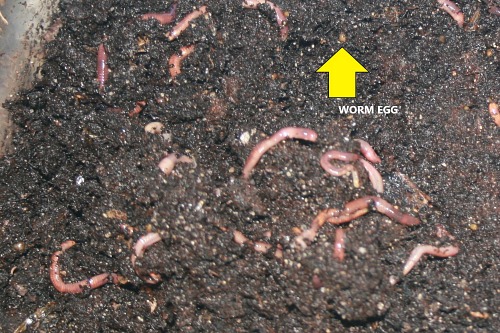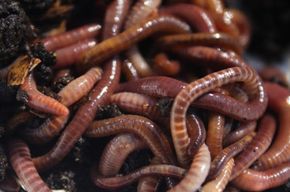Red Wiggler Worms - Reliable Decomposers for Your Garden Compost Container
Red Wiggler Worms - Reliable Decomposers for Your Garden Compost Container
Blog Article
Discovering the Interesting World of Red Wiggler Worms: Lasting Solutions for Waste Administration and Dirt Health And Wellness
Within the elaborate internet of lasting options for waste management and dirt health and wellness, one commonly forgot yet tremendously advantageous player arises - the red wiggler worm. These humble animals, with their voracious cravings for organic issue, hold the secret to changing waste into nutrient-rich garden compost. As we peer into the interesting world of red wigglers, a much deeper understanding of their role in the ecological community unfolds, clarifying their potential to change the method we approach garbage disposal and soil fertility.
The Role of Red Wigglers in Waste Administration
Utilizing red wiggler worms in waste management procedures shows a effective and sustainable method for organic issue decay. These voracious composting champs come from the varieties Eisenia fetida and are renowned for their capacity to break down food scraps, paper, and other natural materials right into nutrient-rich garden compost. Red wigglers stand out in transforming kitchen area waste and garden particles into vermicompost, a valuable resource that can boost soil fertility and framework.
Red wigglers play an important duty in waste management by consuming and digesting organic issue, consequently reducing the volume of waste that winds up in landfills. Their digestive process not only helps to divert waste from conventional disposal techniques however additionally generates high-quality compost that can be utilized in gardening, landscaping, and farming. The castings left behind by red wigglers are rich in crucial nutrients like nitrogen, phosphorus, and potassium, making them a lasting and all-natural alternative to chemical fertilizers - Red Wiggler Worms.
Benefits of Vermicomposting With Red Wigglers

One trick advantage is the speed at which red wigglers damage down organic materials. These worms have a voracious cravings and can process big amounts of food waste rapidly, resulting in faster garden compost manufacturing contrasted to standard techniques. Additionally, the vermicompost generated by red wigglers is abundant in crucial nutrients like potassium, phosphorus, and nitrogen, making it an exceptional organic fertilizer for plants.
Furthermore, vermicomposting with red wigglers aids divert natural waste from land fills, minimizing greenhouse gas emissions and adding to a more sustainable waste monitoring system. By recycling natural issue through vermicomposting, people and communities can minimize their environmental footprint while developing a beneficial resource for improving dirt framework and fertility. Overall, the benefits of vermicomposting with red wigglers make it a economical and environmentally friendly service for taking care of natural waste and boosting dirt health.
Red Wigglers: Nature's Dirt Engineers
Understood for their impressive capacity to change the make-up and top quality of soil, red wigglers play a vital duty in improving community dynamics through their dirt design prowess. These humble earthworms burrow through the dirt, producing tunnels that improve aeration and water infiltration. By doing so, they promote origin development and nutrient uptake by plants, eventually contributing to enhanced soil fertility. Red wigglers also break down organic issue like rotting leaves and plant particles, transforming them into nutrient-rich spreadings that enhance the soil with essential minerals and beneficial microbes. Their consistent motion helps to mix dirt layers, distributing nutrients more uniformly and creating a healthy and balanced environment for dirt organisms.

Red Wigglers and Soil Health
With their profound impact on soil structure and ecosystem Check This Out dynamics, red wigglers contribute in nurturing dirt wellness via their diverse dirt engineering activities. These humble creatures play a vital duty in boosting dirt fertility and framework. Red wigglers break down raw material, such as decomposing fallen leaves and cooking area scraps, right into nutrient-rich spreadings that boost dirt high quality. Their burrowing tasks produce passages that freshen the dirt, enabling better water infiltration and root development. By boosting microbial activity in the soil, red wigglers help in vitamins and mineral biking, making crucial nutrients a lot more offered to plants. Their spreadings include valuable microorganisms that aid reduce unsafe microorganisms, advertising plant health. Red wigglers likewise add to soil gathering, which enhances dirt framework and stability, lowering erosion dangers. On the whole, the existence of red wigglers in the dirt is a clear sign of a healthy and lively ecosystem, demonstrating the crucial function they play in keeping soil health and sustainability.
Implementing Red Wigglers for Sustainability
The combination of red wiggler worms into lasting farming methods showcases their essential duty in cultivating ecological stewardship and source performance. These productive animals supply a multitude of benefits when implemented thoughtfully. By presenting red wigglers into composting systems, organic waste can be successfully exchanged nutrient-rich vermicompost, decreasing the requirement for chemical plant foods and shutting the loophole on natural matter application. Moreover, the castings produced by red wiggler worms are abundant in useful microbes and enzymes that enhance soil framework, enhance water retention, and promote plant development.
Along with lose management, red wigglers additionally play a vital function in sustainable food manufacturing. Their capability to swiftly refine raw material not only reduces greenhouse gas discharges from breaking down waste yet likewise supplies a sustainable resource of protein for livestock and tank farming feed. Integrating red wiggler worms right into farming systems represents an easy yet effective option for enhancing sustainability, advertising circular economic climates, and protecting our precious all-natural sources.
Final Thought
Finally, red wiggler worms play a critical duty in waste monitoring with vermicomposting, benefiting both the environment and soil wellness. Their capacity to damage down organic matter and boost dirt framework makes them useful allies in sustainable methods. By executing read here red wigglers into waste management systems, we can reduce waste, improve dirt high quality, and promote environmental sustainability for a healthier earth.
Understood for their exceptional capability to transform the make-up and high quality of soil, red wigglers play a critical function in enhancing ecological community dynamics via their soil design prowess. On the whole, red wigglers are resource crucial soil engineers that play a crucial role in keeping soil wellness and promoting sustainable ecological community working.
With their profound effect on dirt structure and ecological community dynamics, red wigglers are critical in supporting soil health and wellness via their diverse soil design activities. Red wigglers likewise add to soil gathering, which boosts soil framework and security, reducing disintegration threats. Overall, the existence of red wigglers in the soil is a clear sign of a lively and healthy and balanced ecosystem, demonstrating the vital duty they play in keeping soil health and sustainability.
Report this page